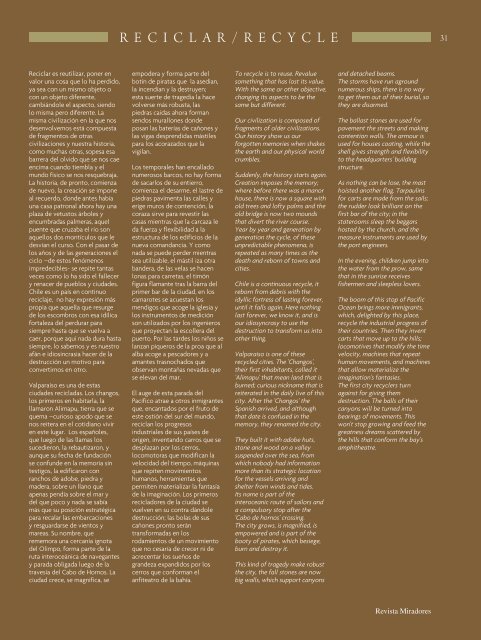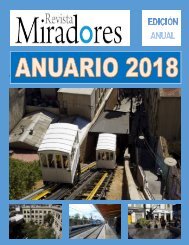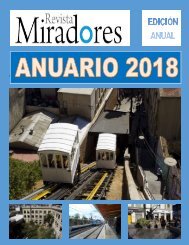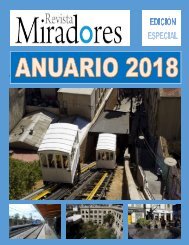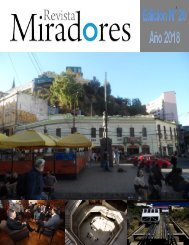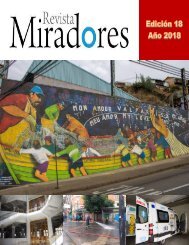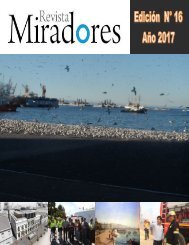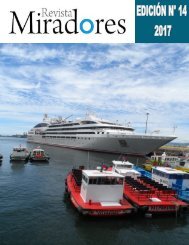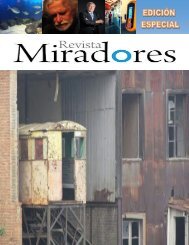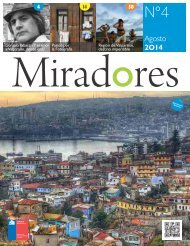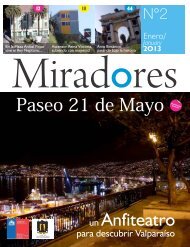Miradores 3° Edicion
Una vitrina de Chile para el Mundo
Una vitrina de Chile para el Mundo
You also want an ePaper? Increase the reach of your titles
YUMPU automatically turns print PDFs into web optimized ePapers that Google loves.
R E C I C L A R / R E C Y C L E<br />
31<br />
Reciclar es reutilizar, poner en<br />
valor una cosa que lo ha perdido,<br />
ya sea con un mismo objeto o<br />
con un objeto diferente,<br />
cambiándole el aspecto, siendo<br />
lo misma pero diferente. La<br />
misma civilización en la que nos<br />
desenvolvemos está compuesta<br />
de fragmentos de otras<br />
civilizaciones y nuestra historia,<br />
como muchas otras, sopesa esa<br />
barrera del olvido que se nos cae<br />
encima cuando tiembla y el<br />
mundo físico se nos resquebraja.<br />
La historia, de pronto, comienza<br />
de nuevo, la creación se impone<br />
al recuerdo, donde antes había<br />
una casa patronal ahora hay una<br />
plaza de vetustos árboles y<br />
encumbradas palmeras, aquel<br />
puente que cruzaba el río son<br />
aquellos dos montículos que le<br />
desvían el curso. Con el pasar de<br />
los años y de las generaciones el<br />
ciclo –de estos fenómenos<br />
impredecibles- se repite tantas<br />
veces como lo ha sido el fallecer<br />
y renacer de pueblos y ciudades.<br />
Chile es un país en continuo<br />
reciclaje, no hay expresión más<br />
propia que aquella que resurge<br />
de los escombros con esa idílica<br />
fortaleza del perdurar para<br />
siempre hasta que se vuelva a<br />
caer, porque aquí nada dura hasta<br />
siempre, lo sabemos y es nuestro<br />
afán e idiosincrasia hacer de la<br />
destrucción un motivo para<br />
convertirnos en otro.<br />
Valparaíso es una de estas<br />
ciudades recicladas. Los changos,<br />
los primeros en habitarla, la<br />
llamaron Alimapu, tierra que se<br />
quema –curioso apodo que se<br />
nos reitera en el cotidiano vivir<br />
en este lugar. Los españoles,<br />
que luego de las llamas los<br />
sucedieron, la rebautizaron, y<br />
aunque su fecha de fundación<br />
se confunde en la memoria sin<br />
testigos, la edificaron con<br />
ranchos de adobe, piedra y<br />
madera, sobre un llano que<br />
apenas pendía sobre el mar y<br />
del que poco y nada se sabía<br />
más que su posición estratégica<br />
para recalar las embarcaciones<br />
y resguardarse de vientos y<br />
mareas. Su nombre, que<br />
rememora una cercanía ignota<br />
del Olimpo, forma parte de la<br />
ruta interoceánica de navegantes<br />
y parada obligada luego de la<br />
travesía del Cabo de Hornos. La<br />
ciudad crece, se magnifica, se<br />
empodera y forma parte del<br />
botín de piratas que la asedian,<br />
la incendian y la destruyen;<br />
esta suerte de tragedia la hace<br />
volverse más robusta, las<br />
piedras caídas ahora forman<br />
sendos murallones donde<br />
posan las baterías de cañones y<br />
las vigas desprendidas mástiles<br />
para los acorazados que la<br />
vigilan.<br />
Los temporales han encallado<br />
numerosos barcos, no hay forma<br />
de sacarlos de su entierro,<br />
comienza el desarme, el lastre de<br />
piedras pavimenta las calles y<br />
erige muros de contención, la<br />
coraza sirve para revestir las<br />
casas mientras que la carcaza le<br />
da fuerza y flexibilidad a la<br />
estructura de los edificios de la<br />
nueva comandancia. Y como<br />
nada se puede perder mientras<br />
sea utilizable, el mástil iza otra<br />
bandera, de las velas se hacen<br />
lonas para carretas, el timón<br />
figura flamante tras la barra del<br />
primer bar de la ciudad, en los<br />
camarotes se acuestan los<br />
mendigos que acoge la iglesia y<br />
los instrumentos de medición<br />
son utilizados por los ingenieros<br />
que proyectan la escollera del<br />
puerto. Por las tardes los niños se<br />
lanzan piqueros de la proa que al<br />
alba acoge a pescadores y a<br />
amantes trasnochados que<br />
observan montañas nevadas que<br />
se elevan del mar.<br />
El auge de esta parada del<br />
Pacífico atrae a otros inmigrantes<br />
que, encantados por el fruto de<br />
este ostión del sur del mundo,<br />
reciclan los progresos<br />
industriales de sus países de<br />
origen, inventando carros que se<br />
desplazan por los cerros,<br />
locomotoras que modifican la<br />
velocidad del tiempo, máquinas<br />
que repiten movimientos<br />
humanos, herramientas que<br />
permiten materializar la fantasía<br />
de la imaginación. Los primeros<br />
recicladores de la ciudad se<br />
vuelven en su contra dándole<br />
destrucción; las bolas de sus<br />
cañones pronto serán<br />
transformadas en los<br />
rodamientos de un movimiento<br />
que no cesaría de crecer ni de<br />
acrecentar los sueños de<br />
grandeza expandidos por los<br />
cerros que conforman el<br />
anfiteatro de la bahía.<br />
To recycle is to reuse. Revalue<br />
something that has lost its value.<br />
With the same or other objective,<br />
changing its aspects to be the<br />
same but different.<br />
Our civilization is composed of<br />
fragments of older civilizations.<br />
Our history show us our<br />
forgotten memories when shakes<br />
the earth and our physical world<br />
crumbles.<br />
Suddenly, the history starts again.<br />
Creation imposes the memory;<br />
where before there was a manor<br />
house, there is now a square with<br />
old trees and lofty palms and the<br />
old bridge is now two mounds<br />
that divert the river course.<br />
Year by year and generation by<br />
generation the cycle, of these<br />
unpredictable phenomena, is<br />
repeated as many times as the<br />
death and reborn of towns and<br />
cities.<br />
Chile is a continuous recycle, it<br />
reborn from debris with the<br />
idyllic fortress of lasting forever,<br />
until it falls again. Here nothing<br />
last forever, we know it, and is<br />
our idiosyncrasy to use the<br />
destruction to transform us into<br />
other thing.<br />
Valparaiso is one of these<br />
recycled cities. The 'Changos',<br />
their first inhabitants, called it<br />
'Alimapu' that mean land that is<br />
burned; curious nickname that is<br />
reiterated in the daily live of this<br />
city. After the 'Changos' the<br />
Spanish arrived, and although<br />
that date is confused in the<br />
memory, they renamed the city.<br />
They built it with adobe huts,<br />
stone and wood on a valley<br />
suspended over the sea, from<br />
which nobody had information<br />
more than its strategic location<br />
for the vessels arriving and<br />
shelter from winds and tides.<br />
Its name is part of the<br />
interoceanic route of sailors and<br />
a compulsory stop after the<br />
'Cabo de hornos' crossing.<br />
The city grows, is magnified, is<br />
empowered and is part of the<br />
booty of pirates, which besiege,<br />
burn and destroy it.<br />
This kind of tragedy make robust<br />
the city, the fall stones are now<br />
big walls, which support canyons<br />
and detached beams.<br />
The storms have run aground<br />
numerous ships, there is no way<br />
to get them out of their burial, so<br />
they are disarmed.<br />
The ballast stones are used for<br />
pavement the streets and making<br />
contention walls. The armour is<br />
used for houses coating, while the<br />
shell gives strength and flexibility<br />
to the headquarters' building<br />
structure.<br />
As nothing can be lose, the mast<br />
hoisted another flag. Tarpaulins<br />
for carts are made from the sails;<br />
the rudder look brilliant on the<br />
first bar of the city; in the<br />
staterooms sleep the beggars<br />
hosted by the church, and the<br />
measure instruments are used by<br />
the port engineers.<br />
In the evening, children jump into<br />
the water from the prow, same<br />
that in the sunrise receives<br />
fishermen and sleepless lovers.<br />
The boom of this stop of Pacific<br />
Ocean brings more immigrants,<br />
which, delighted by this place,<br />
recycle the industrial progress of<br />
their countries. Then they invent<br />
carts that move up to the hills;<br />
locomotives that modify the time<br />
velocity, machines that repeat<br />
human movements, and machines<br />
that allow materialize the<br />
imagination's fantasies.<br />
The first city recyclers turn<br />
against for giving them<br />
destruction. The balls of their<br />
canyons will be turned into<br />
bearings of movements. This<br />
won't stop growing and feed the<br />
greatness dreams scattered by<br />
the hills that conform the bay's<br />
amphitheatre.<br />
Revista <strong>Miradores</strong>


